R&D Blueprint and COVID-19
The current COVID-19 pandemic is unprecedented, but the global response draws on the lessons learned from other disease outbreaks over the past several decades.
As part of WHO’s response, the R&D Blueprint was activated to accelerate diagnostics, vaccines and therapeutics for this novel coronavirus. The Blueprint aims to improve coordination between scientists and global health professionals, accelerate the research and development process, and develop new norms and standards to learn from and improve upon the global response.
On 30 January 2020, following the recommendations of the Emergency Committee, the WHO Director-General declared that the outbreak constitutes a Public Health Emergency of International Concern (PHEIC).
World scientists on COVID-19 then met at the World Health Organization’s Geneva headquarters on 11–12 February 2020 to assess the current level of knowledge about the new virus, agree on critical research questions that need to be answered urgently, and to find ways to work together to accelerate and fund priority research to curtail this outbreak and prepare for those in the future.
The discussion led to an agreement on two main goals. The first was to accelerate innovative research to help contain the spread of the epidemic and facilitate care for those affected. The second was to support research priorities that contribute to global research platforms in hopes of learning from the current pandemic response to better prepare for the next unforeseen epidemic.
Building on the response to recent outbreaks of Ebola virus disease, SARS-CoV and MERS-CoV, the R&D Blueprint has facilitated a coordinated and accelerated response to COVID-19, including an unprecedented program to develop a vaccine, research into potential pharmaceutical treatments and strengthened channels for information sharing between countries.Events
Highlights
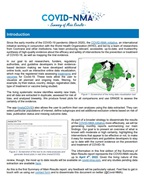
COVID-19 NMA Summary Report
Since the early months of the COVID-19 pandemic (March 2020), the COVID-NMA initiative, an international initiative working in conjunction with the...
Reports
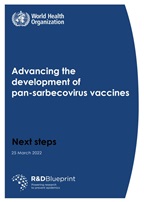
During this consultation (the second specifically addressing this topic) global experts reviewed the available evidence, enumerate knowledge gaps, and...
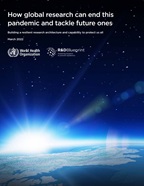
In the course of the pandemic, the World Health Organization (WHO) has hosted three critical forums of world experts on research and innovation that...
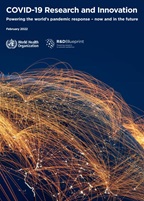
COVID-19 Research and Innovation. Powering the world’s pandemic response – now and in the future
This updated report once again brings a spotlight to the immense and tireless global research effort to control COVID-19.The report not only details...

COVID-19 Research and Innovation Achievements
This report provides a summary of global research initiatives and achievements to tackle COVID-19 agreed at the outset of the pandemic. Within a few weeks...

Statement of the WHO Working Group on COVID-19 Animal Models (WHO-COM) about the UK and South African...
The WHO-COM is an expert group of more than 150 scientists around the world with expertise in animal models of viral diseases. Since February 2020 the...
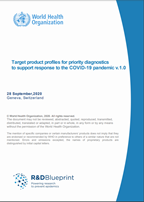
COVID-19 Target product profiles for priority diagnostics to support response to the COVID-19 pandemic...
WHO is publishing here the final version of Target Product Profiles (TPP) for priority COVID-19 diagnostics. These TPPs describe the desirable...

A Coordinated Global Research Roadmap
On 11-12 February 2020, WHO, in collaboration with the Global Research Collaboration for Infectious Disease Preparedness and Response (GLOPID-R) –...
Vaccines
Expert groups
Achievements
Reports
Prioritization of candidate vaccines for international support for further evaluation including Phase IIb/3 randomized clinical trials
WHO Working Group – Target Product Profiles for COVID-19 Vaccines
WHO Working Group – Core Protocol for vaccines against COVID-19
WHO Working Group – Vaccine R&D for COVID-19 Vaccines
WHO Working Group – Animal Models
WHO Working Group – Viruses, Reagents and Immune assays
Studies per country, showing study design, type of vaccine, study phase and type of patients.
Disclaimer on third-party websites*
COVID-19 vaccine tracker and landscape
WHO Target Product Profiles for COVID-19 Vaccines. Revised version April 2022
Feasibility, potential value and limitations of establishing a closely monitored challenge model of experimental COVID-19 infection and illness in healthy young adult volunteers
Global animal laboratories capacities to support vaccine and therapeutic evaluation
Criteria for COVID-19 vaccine prioritization
Overview of the types/classes of candidate vaccines against MERS-CoV
Overview of the types/classes of candidate vaccines against SARS-CoV
WHO calls for comments on the revised Target Product Profile for COVID-19 vaccines
Assays & Animal Models - Outline of research priorities related to the Omicron variant
Emerging evidence on additional doses of COVID-19 vaccines and their safety
WHO COVID-19 Vaccines Research: Can booster doses contribute to control this pandemic: what research is needed?
Methodological approaches to assess variants effect on vaccine efficacy, effectiveness and impact
Report of the WHO AG on human challenge studies
COVID-19 vaccines: Knowledge gaps and research priorities - WHO ad hoc consultation
COVID-19 new variants: Knowledge gaps and research
COVID-19 Target product profiles for priority diagnostics to support response to the COVID-19 pandemic v.1.0
COVID-19 Animal Models - Summary of progress made by the WHO COVID-19 modelling (March-04 June 2020)
Summary of progress made by the WHO assays for vaccines group of experts (18 March – 1 April)
COVID-19 Animal Models - Summary of progress made by the WHO COVID-19 modelling (15-26 March 2020)
COVID-19 Animal Models - Summary of progress made by the WHO COVID-19 modelling (27 February - 15 March 2020)
Therapeutics
Expert groups
Achievements
Studies per country, showing study design, disease severity in study participants, and type of treatment being studied, as well as network maps of these studies.
List of treatment comparisons, a summary of the evidence for that comparison, and a detailed description of primary studies, including a risk of bias assessment.
Disclaimer on third-party websites*
An international randomised trial of additional treatments for COVID-19 in hospitalised patients who are all receiving the local standard of care
Targeted Update: Safety and efficacy of hydroxychloroquine or chloroquine for treatment of COVID-19
COVID 19 candidate treatments
Outline of designs for experimental vaccines and therapeutics
Reports
WHO Joint Advisory Group on COVID 19 Therapeutics Prioritization - DRAFT Statement on the possible effects of the new SARS CoV-2 Omicron variant on treatment of hospitalized COVID-19 patients
WHO Target Product Profiles for COVID-19 Therapeutics for non-hospitalized patients
WHO target product profiles for COVID-19 therapeutics
Informal consultation on the potential inclusion of Sofosbuvir/Daclatasvir in a clinical trial - 19 June 2020
Informal consultation on the potential inclusion of Immunomodulators in a clinical trial - 13 May 2020
Informal consultation on the dose of chloroquine and hydroxychloroquine for the SOLIDARITY Clinical Trial - 8 April 2020
Clinical Trial Design Working Group – consultation on immunomodulators - 7th May 2020
Informal consultation on the potential inclusion of Immunomodulators in a clinical trial - 6 May 2020
Informal consultation on the role of therapeutics in COVID-19 prophylaxis and post-exposure prophylaxis - 1 May 2020
Informal consultation on the role of therapeutics in COVID-19 prophylaxis and post-exposure prophylaxis - 16 April 2020
Informal consultation on the role of therapeutics in COVID-19 prophylaxis and post-exposure prophylaxis - 15 April 2020
Informal consultation on the potential role of interleukin-6 blockers in the clinical management of COVID-19 infection - 11th April 2020
Informal consultation on the role of therapeutics in COVID-19 prophylaxis and post-exposure prophylaxis - 10 April 2020
WHO R&D Blueprint COVID-19: Informal consultation on the potential inclusion of Favipiravir in a clinical trial
Informal consultation on the role of IL-6/IL-1
Informal consultation on the potential role of chloroquine in the clinical management of COVID 19 infection
Outline of trial designs for experimental therapeutics
Informal consultation on prioritization of candidate therapeutic agents for use in novel coronavirus 2019 infection
Outline of designs for experimental vaccines and therapeutics - 20 January 2020
Infection Prevention and Control
Terms of Reference of the WHO COVID-19 Infection Prevention and Control Research Working Group
WHO COVID-19 infection prevention and control (IPC) pillar achievements. February 2020 – January 2021
Human-Animal-Environment Interface
Ethics
Ethical considerations to guide the use of digital proximity tracking technologies for COVID-19 contact tracing
Guidance for research ethics committees for rapid review of research during public health emergencies
Key criteria for the ethical acceptability of COVID-19 human challenge studies
Ethical standards for research during public health emergencies: Distilling existing guidance to support COVID-19 R&D
Q&As
Social Science
WHO COVID-19 social science in outbreak response. Community-centred approaches to health emergencies: progress, gaps and research priorities.
Perceptions of Health workers regarding health facility infection prevention and control procedures for COVID-19: A Research Template
COVID-19 Social Science working group
Working with Community Advisory Boards for COVID-19 related clinical studies
Meetings
All →* Disclaimer
This website and/or database of the World Health Organization (collectively “WHO Site”) may contain links to websites, databases and/or materials developed, sponsored or maintained by third parties unaffiliated with the World Health Organization (collectively, “Third Party Sites”).
The World Health Organization (WHO) provides links to Third Party Sites solely as a convenience to users of this WHO Site. WHO makes no (and hereby disclaims any) representations, warranties or guarantees of any kind (whether express or implied) as to—and shall have no liability whatsoever arising from—any links, Third Party Sites and/or any content provided therein or accessible therefrom, including, without limitation, any representations, warranties or guarantees as to the non-infringement, fitness for a particular purpose, accuracy, completeness, subject matter, timeliness or quality of any Third Party Site or any content provided therein or accessible therefrom, and/or the use of any information (including, without limitation, personal information) that you provide to any such Third Party Sites.
The inclusion of links to any Third Party Sites shall not create any liability for WHO arising from or relating to any such links, Third Party Sites and/or any content provided therein or accessible therefrom; and your use of any and all of the foregoing is entirely at your own risk and responsibility. Accordingly, you forever hold WHO harmless from any and all claims, liabilities and/or obligations of any kind arising from or in connection with the use of any such links, Third Party Sites and/or content provided therein or accessible therefrom.
WHO reserves the right, in its sole discretion, to discontinue links to any Third Party Sites at any time for any reason. Should you leave the WHO Site via a link contained herein, the content you view in any Third Party Site is not provided or controlled by WHO. The inclusion on this WHO Site of a link to any Third Party Site does not constitute, and shall not be construed as, an endorsement, approval or recommendation by WHO of such Third Party Site and/or of any content, goods or services provided thereon or accessible therefrom.

